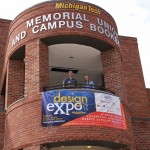 Award Winners of the 2015 Design Expo at Michigan Tech have been announced and are listed below. A summary of links to photos, videos and news articles is also included.
Award Winners of the 2015 Design Expo at Michigan Tech have been announced and are listed below. A summary of links to photos, videos and news articles is also included.
The Design Expo highlights hands-on, discovery-based learning at Michigan Tech. More than 600 students in Enterprise and Senior Design teams showcase their work and compete for awards. A panel of judges, made up of corporate representatives and Michigan Tech staff and faculty members, critique the projects.
Many of them are sponsored by industry, which allows students to gain valuable experience through competition at the Expo, as well as direct exposure to real industrial problems. The fourteenth annual Expo is a combined effort of the College of Engineering and the Pavlis Honors College. The 2015 Expo was held in the Ballroom of the Memorial Union Building.
Meritor: Running Strong. Building Momentum. Looking Forward. Enterprise Awards
Based on poster and presentation
Enterprise –
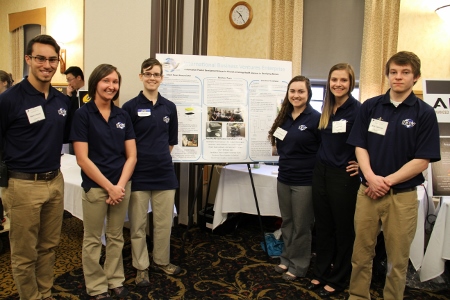
1st Place Award – 215- IBV
Team Leaders: Leslie LaLonde and Andrew Clark, Biomedical Engineering
Advisors: Robert Warrington, Pavlis Honors College
Sponsor: Pavlis Honors College
Project Overview: The Infant Heart Annunciator is a small, BandAid-shaped device that detects an infant’s electrocardiogram, producing a visible flash and audible tone. Often in developing countries, those present at birth do not have the training or equipment needed to determine if an unresponsive infant is alive. Our goal is to eliminate this unnecessary loss of life. Our team is also designing a simple, yet reliable, ventilator that can be stockpiled by hospitals. Typically, hospitals maintain sufficient numbers of ventilators; however, an increase of patients resulting from a pandemic could create a shortage of ventilators. The current high cost of most ICU ventilators prevents hospitals from stockpiling these machines.
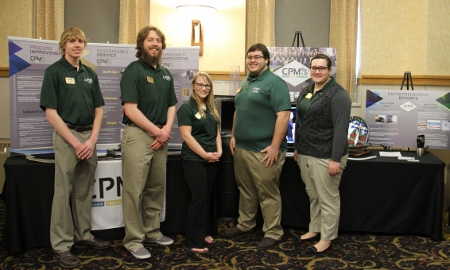
2nd Place Award – 212 – CPM
Team Leader: Paul Hagadone, Chemical Engineering
Advisors: Tony Rogers and Sean Clancey, Chemical Engineering
Sponsors: AFI, BASF Corporation, City of Midland, nanoMAG, Razor Edge Systems, Wisconsin and Southern
Railroad
Project Overview: CPM aims to exceed the expectations of company sponsors, improve the lives of consumers through innovation, and develop students into highly marketable professionals. The project goals for our
team include improving runoff models to provide advanced flood warning in Midland, designing a kiln
for cleaner charcoal production in Benin, using food waste as an alternative energy source at Michigan
Tech, developing a water filtration system to cool industrial process streams, curing coatings at lower
temperatures using catalysts, integrating hightech materials into athletic equipment, designing
collapsible packaging for a large volume of liquid product, and conceiving and testing an innovative
product idea from within CPM.
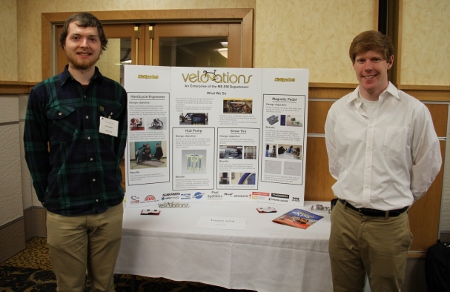
3rd Place Award – 224 – Velovations
Team Leaders: Ian Connick, Mechanical Engineering and Kyle McGurk, Electrical Engineering
Advisor: Steve Lehmann and Paulus Van Susante, Mechanical Engineering-Engineering Mechanics
Sponsors: Specialized, Thomson, Department of Kinesiology and Integrative Physiology
Project Overview: Our team is dedicated to working on bicycle and bicycling industry related projects. For the 2014-2015 academic year, Velovations has more than twenty-five students from various majors divided
into four projects. The projects are: a pedal that offers the ability to transition from clipped in to
a platform and back at the push of a button; a system to allow tire pressure change on the fly;
an inexpensive winter commuting tire; and an innovative exercise system for wheelchair users that will allow further physical research. Velovations projects cover the complete product development
range, from idea conception, research, and development, to customer communication, testing, and ultimately manufacturing.
Black and Veatch: Building a World of Difference® Senior Design Awards: Based on poster
Senior Design –
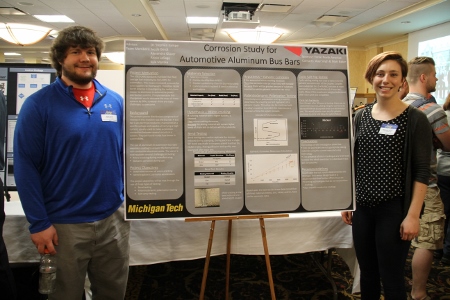
1st Place Award – 145 – Aluminum Corrosion Study
Team Members: Annie LeSage, Jacob Gerdt, Kyle Myszka, and Alexandra Glover, Materials Science and Engineering
Advisor: Steve Kampe, Materials Science and Engineering
Sponsor: Yazaki North America
Project Overview: The switch from copper to aluminum in automotive electrical systems is advantageous to U.S automakers and automotive component suppliers because it has the potential to decrease vehicle weight and raw materials costs. This switch also poses several challenges. This senior design project characterizes the galvanic corrosion rate of an aluminum substrate with a metallic plating when exposed to an electrolytic solution. This mimics the exposure of electrical components to a fluid containing salts or automotive chemicals. The results of this testing are critical to the success of the copper-to-aluminum substitution in automotive electrical systems. This is because they inform automotive component designers about the expected lifetime of such systems when exposed to a corrosive environment.
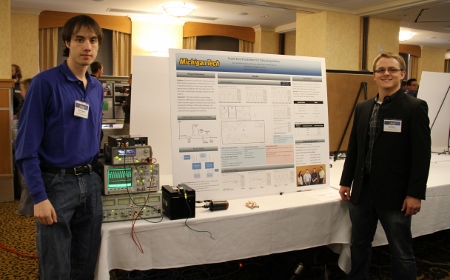
2nd Place Award – 130 – Front End Protection for Data Aquisition
Team Members: Sylvia Ferragut, Caleb Wright, and Ben Veltman, Electrical Engineering; Matthew Zawisza, Computer Engineering
Advisor: Duane Bucheger, Electrical and Computer Engineering
Sponsor: Department of Electrical and Computer Engineering
Project Overview: Often devices under test can behave in erratic ways, resulting in catastrophic damage to expensive test equipment. By designing specifications based on National Instruments’ limitations and typical automotive testing requirements, the team created a buffer box to protect from over-voltage and add layers of isolation. The buffer box, used in conjunction with the $50k–$500k tools being regularly used by the automotive industry, is a simple tool, which can be used by a wide range of people with varying levels of expertise to keep expenses down.
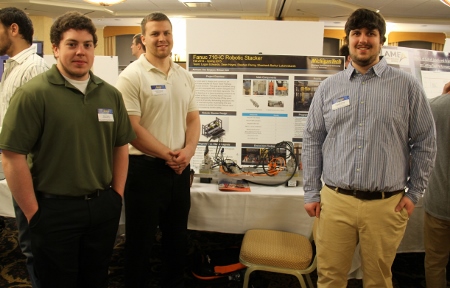
3rd Place Award – 110 – Design and Development of an Automated Stacker for Highway Products of Nucor Steel Corporation
Team Members: Logan Edwards, Sean Hayes, Stephen Penny, Electrical Engineering Technology; and Shashank
Lakshmikanth, Mechanical Engineering
Advisor: Seyyedmohsen Azizi, School of Technology
Sponsor: Nucor Steel Corporation
Project Overview: In this project, a robotic stacker is designed to enable precise stacking of highway sign posts produced by Nucor Steel Corporation, while complying with the required stacking pattern as
well as time constraints. Currently this process relies heavily on a manual work force, introducing
many safety hazards as well as inefficiencies and inconsistencies. This project offers a robotic
stacker solution using Fanuc robot manipulators, custom-built end-effectors, and a programmable
logic controller (PLC) integrated with human machine interface (HMI). This will result in smaller
and organized stacks as compared to the current disorganized bundles and removal of a worker from
the hazardous position in the process. Organized stacks will also allow for further downstream
automation processes.
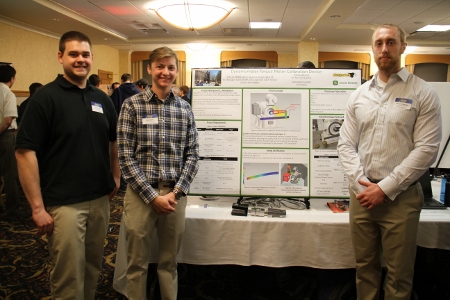
Honorable Mention 1 – 104 – Dynamometer Calibration Device
Team Members: Kristopher Benaglio, Christopher DeGroot, Adam Deibler, Kenneth Smith, Mechanical Engineering
Advisor: Paul van Susante, Mechanical Engineering-Engineering Mechanics
Sponsor: John Deere
Project Overview: This design team is working with John Deere to develop a new dynamometer torque meter calibration device. A dynamometer, commonly referred to as a dyno, is a popular test instrument used to measure variables such as torque, speed, and power output. The current calibration method used by John Deere utilizes a static weight stack attached to a moment arm. This design must be replaced because it exceeds the dynamometer test cell envelope, is difficult to transport from test cell to test cell, requires considerable time and effort for two workers to assemble and disassemble, and requires the repetitive lifting of 40 to 45 pound weights.
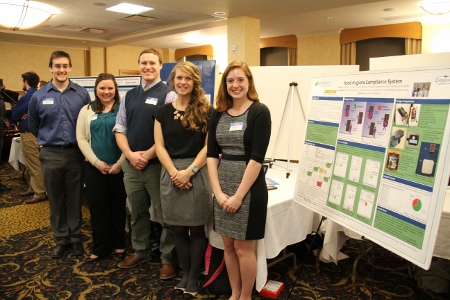
Honorable Mention 2 – 128 – Compliance Keweenaw..
Honorable Mention 2 – 128 – Compliance Keweenaw: Aspirus Keweenaw Hand-washing Compliance System
Team Members: Anna Waller, Jannah Brandt, Drew Markel, Creighton Bradley, and Rebecca Manshaem, Biomedical Engineering
Advisor: Bruce Lee, Biomedical Engineering
Sponsor: Aspirus Keweenaw
Project Overview: Hand hygiene is of importance to hospitals not only for the safety and health of employees but also to reduce the spread of hospital-acquired infections and protect patients. Aspirus Keweenaw recruited our team to create an automated system to track hand-washing compliance among employees to assist them in their goal of 100 percent compliance. We created a system using a microcontroller and
RFID readers to detect when a healthcare worker enters a patient’s room and reaches compliance
using the sanitizing foam dispenser. This system will be placed near the doorway and communicate with
a wristband that identifies the healthcare worker and vibrates as a reminder if compliance is not
reached.
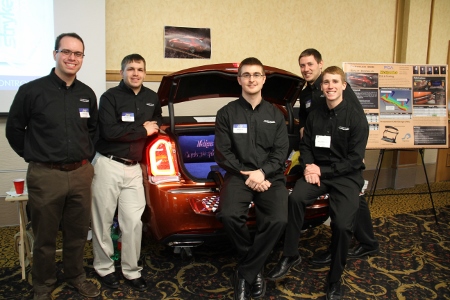
Honorable Mention 3 – 138 – Chrysler 300 Split Tailgate
Honorable Mention 3 – 138 – Chrysler 300 Split Tailgate
Team Members: Kelly Shanahan, Joshua Yagley, Alex Bancroft, Jerad Marble, and Parry Ragland, Mechanical
Engineering
Advisor: Kevin Johnson, Mechanical Engineering-Engineering Mechanics
Sponsor: Fiat Chrysler Automobiles
Project Overview: Our goal is to design, engineer, build, and test a split decklid adapted from the current Chrysler 300 architecture. This decklid system will provide the customer both the access required of typical decklids without the upswing of the lower waterfall area and the added feature of a tailgate style lower swing out panel which will provide a surface for tailgate functions. This feature is rare in the industry and provides an opportunity for segment differentiation creating a unique selling point.
Summary: More information:
2015 Design Expo Photo Gallery
Video Playlist from Michigan Tech Expo Channel on YouTube
2015 Design Expo Image Contest Entries
The Design Expo 2015 Image Contest winners have been selected. Congratulations to MSE senior design team members Jordan Pontoni, Calvin Nitz, Shane Anderson and Austin DePottey for their first place image of a team member at work in the foundry. The image illustrates the team’s project, Casting 357 Aluminum, sponsored by Eck Industries. The team’s advisor is MSE engineer/scientist Thomas Wood.
Team 150, Title: “E357 Alloying to Increase Elongation and Maintain Mechanical Properties”, the foundry shot.
Robotics Systems Enterprise team won second place for its image of ECE student Kealy Smith working on an Afraid-of-the-Dark bot. The team is sponsored by ArcelorMittal.
then 216 (Robotics Systems Enterprise), and 205 (Blue Marble Enterprise).
2015 Design Expo Booklet (4Mb PDF)
2015 Design Expo Weblog (4Mb PDF)
Michigan Tech news article: Design Expo 2015 Success: Winners, Senior Design and Enterprise Projects
Pre-event news Michigan Tech article: Get Ready, Get Set: Design Expo 2015